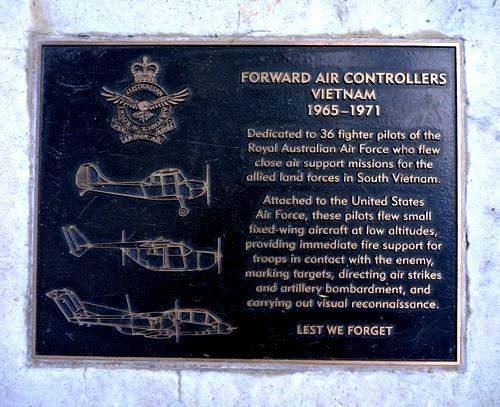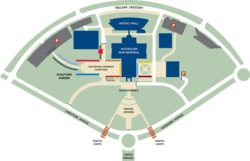
Forward Air ControllersPrint Page 
The plaque commemorates the Royal Australian Air Force (R.A.A.F.) personnel who served as forward air controllers during the Vietnam War between 1965 and 1971.
The plaque location is indicated by the red poppy in the second image.
Thirty six R.A.A.F. pilots flew as FACs - Forward Air Controllers - in South Vietnam. They were selected from fighter pilots with at least two tours and served with the USAF for terms varying from six months to a year. As 'on scene' air commanders they controlled close air support for friendly forces and integrated it with other support from helicopter gun-ships and artillery.
Australia's military involvement in the Vietnam War began with the arrival of the Australian Army Training Team Vietnam (AATTV) in South Vietnam during July and August 1962. Australia's participation in the war was formally declared at an end when the Governor-General issued a proclamation on 11 January 1973.
However, the end-date of Australia's involvement in the Vietnam War has officially been amended to 29 April 1975 to reflect Australia’s further involvement in the war during the fall of Saigon in 1975. The Department of Veterans Affairs and the Australian War Memorial, in Canberra now recognise this new date.
Location
| Address: | Fairbairn & Limestone Avenues, Behind Captain Reg Saunders Courtyard, Australian War Memorial, Campbell, 2612 |
|---|---|
| State: | ACT |
| Area: | AUS |
| GPS Coordinates: | Lat: -35.280105 Long: 149.148335 Note: GPS Coordinates are approximate. |
Details
| Monument Type: | Plaque |
|---|---|
| Monument Theme: | Conflict |
| Sub-Theme: | Vietnam |
| Approx. Event Start Date: | 1965 |
| Approx. Event End Date: | 1971 |
Dedication
| Actual Monument Dedication Date: | Monday 28th April, 2008 |
|---|
Forward Air Controllers
Vietnam
1965 - 1971
Dedicated to 36 fighter pilots of the Royal Australian Air Force who flew close air support missions for the allied land forces in South Vietnam.
Attached to the United States Air Force, these pilots flew small fixed-wing aircraft at low altitudes, providing immediate fire support for troops in contact with the enemy, marking targets, directing air strikes and artillery bombardment, and carrying out visual reconnaissance.
Lest We Forget






